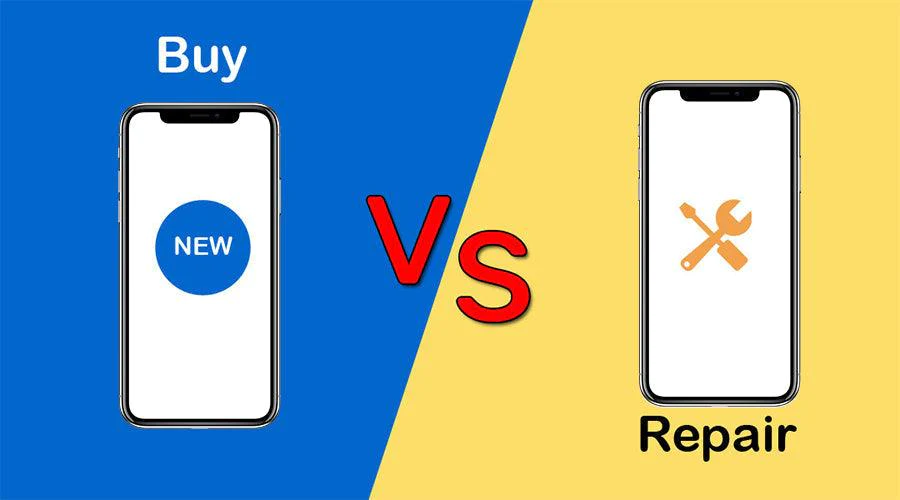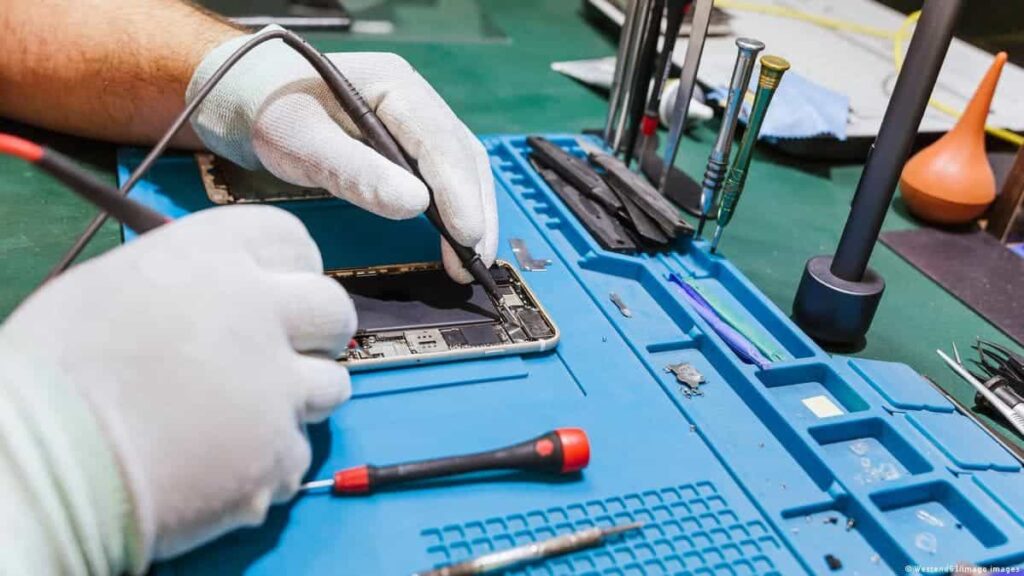Determining whether to repair your smartphone or buy a new one depends on various factors, including the extent of the damage, the age of your device, your budget, and your preferences. Here’s a breakdown to help you decide which option is best for you:

Repairing Your Smartphone:
Cost-Effectiveness:
- Repairing your smartphone can be more cost-effective than purchasing a new one, especially if the damage is minor or limited to specific components such as the screen or battery. Repairing a single component is generally less expensive than buying a new device altogether.
Environmental Impact:
- Repairing your smartphone contributes to sustainability by extending its lifespan and reducing electronic waste. Opting for repairs instead of replacement helps conserve natural resources and minimizes the environmental footprint associated with manufacturing new devices.
Retaining Data and Customization:
- Repairing your smartphone allows you to retain your data, settings, and customization preferences. You won’t need to go through the hassle of transferring data or setting up a new device, preserving your digital ecosystem and personalized experience.
Attachment and Familiarity:
- If you’re attached to your current smartphone or prefer its design, features, or operating system, repairing it allows you to continue using a device you’re familiar with and comfortable using. You can maintain continuity in your user experience without adapting to a new device.
Immediate Solution:
- Repairing your smartphone provides an immediate solution to address issues such as cracked screens, battery degradation, or software glitches. You won’t need to wait for a new device to arrive or go through the setup process, allowing you to resume normal usage promptly.
Buying a New Smartphone:
Advanced Features and Technology:
- Purchasing a new smartphone offers access to the latest features, technology advancements, and performance improvements. New devices often boast enhanced cameras, faster processors, expanded storage, and additional functionalities that may not be available in older models.
Warranty and Support:
- Buying a new smartphone typically comes with a manufacturer warranty and access to customer support services. You’ll have peace of mind knowing that your device is covered against defects and malfunctions, and you can seek assistance if you encounter any issues.
Long-Term Investment:
- Investing in a new smartphone ensures that you’re equipped with a device that meets your current and future needs. Newer devices tend to receive software updates and support for a longer period, providing longevity and compatibility with evolving technologies.
Trade-In and Upgrade Options:
- Upgrading to a new smartphone may come with trade-in options, discounts, or incentives from your carrier or retailer. You can trade in your old device for credit towards the purchase of a new one, reducing the overall cost of the upgrade.
Aesthetic Appeal and Brand New Condition:
- Purchasing a new smartphone allows you to enjoy its pristine condition, sleek design, and aesthetic appeal. You’ll have the satisfaction of owning a brand-new device with no signs of wear or previous damage.
Ultimately, the decision to repair your smartphone or buy a new one depends on your individual circumstances, preferences, and priorities. If your current device meets your needs and can be repaired at a reasonable cost, opting for repairs may be the most practical and sustainable choice. However, if your device is outdated, severely damaged, or no longer meets your needs, upgrading to a new smartphone may offer the best solution for enhanced performance, features, and longevity. Consider weighing the pros and cons of each option and evaluating your specific requirements to make an informed decision that aligns with your goals and budget.

When faced with a damaged smartphone, whether to repair it or buy a new one can be a tough decision. Several factors should be considered before making your choice:
- The extent of Damage: Assess the extent of the damage to your smartphone. If it’s just a minor issue like a cracked screen or a non-functioning button, repair might be a more cost-effective option. However, if the damage is extensive and affects multiple components, purchasing a new phone might be the better choice.
- Age of the Phone: Consider the age of your smartphone. If your phone is relatively new and still under warranty, repairing it may be the most sensible option. On the other hand, if your phone is several years old and nearing the end of its lifecycle, investing in a new phone might be a better long-term solution.
- Cost of Repair vs. Cost of New Phone: Compare the cost of repairing your smartphone with the cost of purchasing a new one. In some cases, repairing a damaged phone can be more affordable than buying a brand-new device, especially if it’s a high-end model.
- Future Reliability: Think about the reliability of your smartphone after repair. If the repair is done properly by a reputable technician using quality parts, your phone may continue to function well for an extended period. However, if your phone has a history of recurring issues or if the repair is not guaranteed, investing in a new phone might provide greater peace of mind.
- Desired Features and Upgrades: Consider whether repairing your current phone will meet your needs in terms of features and functionality. If you’re satisfied with your current phone and don’t feel the need for upgrades, repairing it may be sufficient. However, if you’re looking for newer features or improved performance, purchasing a new phone may be the better option.
- Data and Settings: Take into account your data and settings stored on the phone. If you repair your current phone, you won’t have to transfer your data and settings to a new device. However, if you opt for a new phone, you’ll need to back up and transfer your data, which can be a hassle.
- Environmental Impact: Consider the environmental impact of your decision. Repairing your current phone instead of buying a new one can help reduce electronic waste and minimize your carbon footprint.
Ultimately, the decision to repair your smartphone or buy a new one depends on your individual circumstances, including the extent of the damage, the age of the phone, cost considerations, desired features, and environmental concerns. Take the time to carefully weigh these factors before making your decision.
Tech tantrums? We’ve got the fix! ????️ laptops ????️ to iPhones ????, MacBooks ???? to iPads, Your one-stop solution for all things digital. From laptops to smartphones, we mend them all! ???? Visit digimob.com.au for swift and reliable repairs. ????


